Define cl - Study guides, Class notes & Summaries
Looking for the best study guides, study notes and summaries about Define cl? On this page you'll find 494 study documents about Define cl.
Page 2 out of 494 results
Sort by
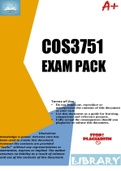
-
COS3751 EXAM PACK 2023
- Exam (elaborations) • 263 pages • 2023
-
Available in package deal
-
- $2.65
- 2x sold
- + learn more
Cos3751 exam pack 2022 Artificial intelligence (University of South Africa) lOMoARcPSD| COS3751 Examination Preparation Page 1 of 12 Question 1 State Spaces [7] (a) Define the concept of a Fully observable environment. (1) An environment is said to be Fully observable if an agent’s sensors give it access to the complete state of the environment at each point in time. (b) Consider a game of chess. Is this a deterministic or stochastic environment? Clearly explain why. (2) Det...
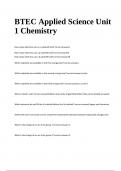
-
BTEC Applied Science Unit 1 Chemistry (2024/2025 Graded)
- Exam (elaborations) • 31 pages • 2024
-
- $11.49
- + learn more
BTEC Applied Science Unit 1 Chemistry (2024/2025 Graded) How many electrons can a d subshell hold? correct answer10 Which subshells are available in the first energy level? correct answers Which subshells are available in the second energy level? correct answers and p Which subshells are available in the third energy level? correct answers, p and d What is Hund's rule? correct answerOrbitals must all be singly filled before they can be doubly occupied Which elements do not fill the 4s subs...
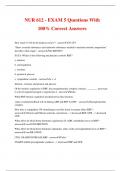
-
NUR 612 - EXAM 5 Questions With 100% Correct Answers
- Exam (elaborations) • 32 pages • 2024
- Available in package deal
-
- $14.49
- + learn more
NUR 612 - EXAM 5 Questions With 100% Correct Answers How much % CO do the kidneys recieve? - answer20-25% "filters essential substances and reabsorbs substances needed to maintain normal composition" describes what organ? - answerthe KIDNEY! SATA: Which of the following mechanisms controls RBF? a. intrinsic b. autoregulation c. extrinsic d. protein & glucose e. sympathetic controls - answera, c, d Intrinsic, extrinsic and protein and glucose Of the intrinsic regulation of RBF, the ...
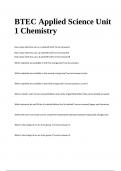
-
BTEC Applied Science Unit 1 Chemistry (Graded)
- Exam (elaborations) • 31 pages • 2024
-
- $12.99
- + learn more
BTEC Applied Science Unit 1 Chemistry (Graded) How many electrons can a d subshell hold? correct answer10 Which subshells are available in the first energy level? correct answers Which subshells are available in the second energy level? correct answers and p Which subshells are available in the third energy level? correct answers, p and d What is Hund's rule? correct answerOrbitals must all be singly filled before they can be doubly occupied Which elements do not fill the 4s subshell befor...
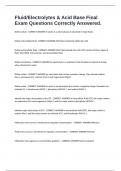
-
Fluid/Electrolytes & Acid Base Final Exam Questions Correctly Answered.
- Exam (elaborations) • 11 pages • 2024
-
Available in package deal
-
- $14.49
- + learn more
Fluid/Electrolytes & Acid Base Final Exam Questions Correctly Answered. Define solute - CORRECT ANSWER A solute is a solid substance dissolved in body fluids. Define intracellular fluid - CORRECT ANSWER (ICF) fluid contained within the cells Define extracellular fluid - CORRECT ANSWER (ECF) fluid outside the cells. ECF consists of three types of fluid: interstitial, intravascular, and transcellular fluid. Define electrolyte - CORRECT ANSWER An electrolyte is a substance that develops...
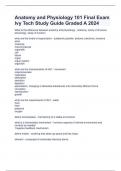
-
Anatomy and Physiology 101 Final Exam Ivy Tech Study Guide Graded A 2024
- Exam (elaborations) • 13 pages • 2024
-
Available in package deal
-
- $10.99
- + learn more
What is the difference between anatomy and physiology - anatomy- study of structure physiology- study of function what are the levels of organization - subatomic particle- protons, electrons, neutrons atom molecule macromolecule organelle cell tissue organ organ system organism what are the characteristics of life? - movement responsiveness respiration absorption secretion digestion assimilation- changing of absorbed substances into chemically different forms circulation ...
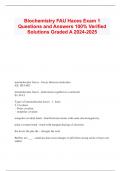
-
Biochemistry FAU Haces Exam 1 Questions and Answers 100% Verified Solutions Graded A 2024-2025
- Exam (elaborations) • 13 pages • 2024
- Available in package deal
-
- $13.99
- + learn more
intermolecular forces - forces between molecules EX: HCl-HCl intramolecular forces - hold atoms together in a molecule Ex: H-Cl Types of intramolecular forces - 1. Ionic 2. Covalent - Polar covalent - nonpolar covalent nonpolar covalent bond - bond between atoms with same electronegativity polar covalent bond - bond with unequal sharing of electrons the lower the pka the - stronger the acid Buffers are ___ - solutions that resist changes in pH when strong acids or bases ...
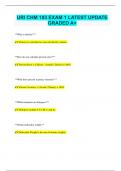
-
URI CHM 103 EXAM 1 LATEST UPDATE GRADED A+
- Exam (elaborations) • 11 pages • 2024
-
Available in package deal
-
- $9.99
- + learn more
URI CHM 103 EXAM 1 LATEST UPDATE GRADED A+ **What is density?** Density is calculated as mass divided by volume. **How do you calculate percent error?** Percent Error = ((Theory - Actual) / Theory) × 100% **What does percent accuracy measure?** Percent Accuracy = (Actual / Theory) × 100% **Which elements are halogens?** Halogens include F, Cl, Br, I, and At. **Define molecular weight.** Molecular Weight is the sum of atomic weights. **What is the formula for calculating atomic...
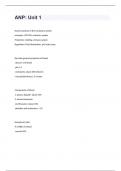
-
ANP: Unit 1 questions with answers 2024
- Exam (elaborations) • 12 pages • 2024
- Available in package deal
-
- $12.99
- + learn more
ANP: Unit 1Name functions of the circulatory system transport: O2/CO2, nutrients, wastes Protection: Clotting, immune system Regulation: Fluid distribution, pH, body temp Describe general properties of blood -about 5 L of blood -pH=7.4 -osmolarity: about 300 mOsm/L -viscosity(thickness): 5 X water Components of blood 1. plasma (liquid)= about 55% 2. formed elements: -erythrocytes= about 45% -platelets and leukocytes= <1% Hematocrit (Hct) % of RBCs in blood -normal ...
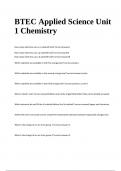
-
BTEC Applied Science Unit 1 Chemistry - Distinction.
- Exam (elaborations) • 31 pages • 2024
-
- $13.49
- + learn more
BTEC Applied Science Unit 1 Chemistry - Distinction. How many electrons can an s subshell hold? correct answer2 How many electrons can a p subshell hold? correct answer6 How many electrons can a d subshell hold? correct answer10 Which subshells are available in the first energy level? correct answers Which subshells are available in the second energy level? correct answers and p Which subshells are available in the third energy level? correct answers, p and d What is Hund's rule? correct ...

That summary you just bought made someone very happy. Also get paid weekly? Sell your study resources on Stuvia! Discover all about earning on Stuvia


